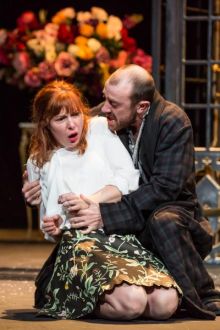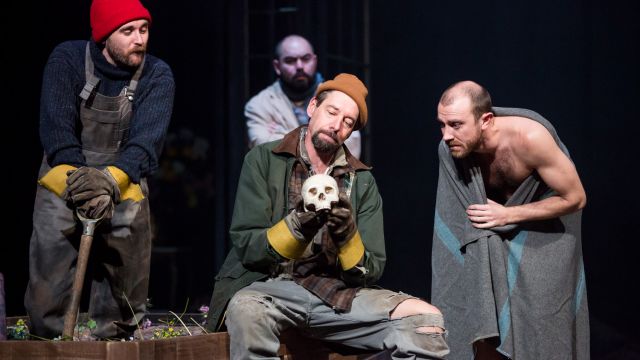Hamlet
Josh McConville unfortunately was too ill to perform his lead as Hamlet on the opening night I attended. Understudy Scott Sheridan put in a magnificent performance in McConville’s place. If you didn’t know Sheridan was the understudy, you’d never guess. His performance is a psychological case study, moving from maddened with the loss of his father through to flagrantly insane, and there are moments when his mood changes instantaneously. He papers over his misery with humour bordering on hysteria—his clowning is darkly funny, but also alarming. For example he manages to squeeze evasion, cheek, rebelliousness, mockery and accusation out of the line which is one word repeated three times.
A portrait of abject grief and mania, this production varies in tone from hilarious to tragic. It pushes against the boundary between comedy and despair, sometimes eliciting that inappropriate laughter which comes from shock. Director Damien Ryan has pulled nuance from the script, overlaying it with meaning relevant to the setting—the 1960s cold war era. In that context Polonius’ spying becomes bugging and recording reel to reel tape, adding an aura of paranoia that extends to everyone, not just Hamlet.
 Ophelia, traditionally trapped between her father’s manipulations and Hamlet’s insanity, is given more agency than usual. Matilda Ridgway plays her as a rebellious but naïve teenager. We first meet her frisking a guard to extract a cigarette, while the guard maintains a poker face. Later, when farewelling her brother Laertes (Michael Wahr), she performs the same pickpocketing trick to draw a foil of condoms from his jacket. The pivotal scene where Hamlet rejects Ophelia is particularly well done, with layers of misdirection, contradiction, miscommunication and subtext.
Ophelia, traditionally trapped between her father’s manipulations and Hamlet’s insanity, is given more agency than usual. Matilda Ridgway plays her as a rebellious but naïve teenager. We first meet her frisking a guard to extract a cigarette, while the guard maintains a poker face. Later, when farewelling her brother Laertes (Michael Wahr), she performs the same pickpocketing trick to draw a foil of condoms from his jacket. The pivotal scene where Hamlet rejects Ophelia is particularly well done, with layers of misdirection, contradiction, miscommunication and subtext.
Polonius (Philip Dodd) is played as a bumbling but good-natured nosy old fool for whom the audience might feel some empathy. Doris Younane and Sean O’Shae are solid and professional as Gertrude and Claudius. O’Shae doubles as an earthly, solid ghost, almost more a zombie, like Banquo in the 2012 Bell Shakespeare Macbeth.
Designer Alicia Clements has continued the pattern of a single impressive structural element dominating the stage, in this case a huge wall of windowpanes, which can be made reflective, opaque transparent or translucent with lighting and curtains. Having Gertrude and Claudius’ marital bed also serve as Ophelia’s grave was a nice metaphorical flourish.
I am not sure whether it added anything to have the internal play scene performed in Italian. While it set up a nice Latin gesticulation joke, and most people will know the play well enough to understand what is happening and why, projected subtitles were distracting and it seemed indulgent and unnecessary. Likewise a projection of (I think it was) Fontinbras speaking in Norwegian didn’t detract but seemed out of place, especially as it wasn’t repeated.
A superb take which I enjoyed even more than Bell’s Henry 4 and Henry V. If this was how well they could perform with last moment understudy Scott Sheridan, I can only imagine how good it will be with the intended lead Josh McConville.
Cathy Bannister
Photographer: Daniel Boud
Subscribe to our E-Newsletter, buy our latest print edition or find a Performing Arts book at Book Nook.

